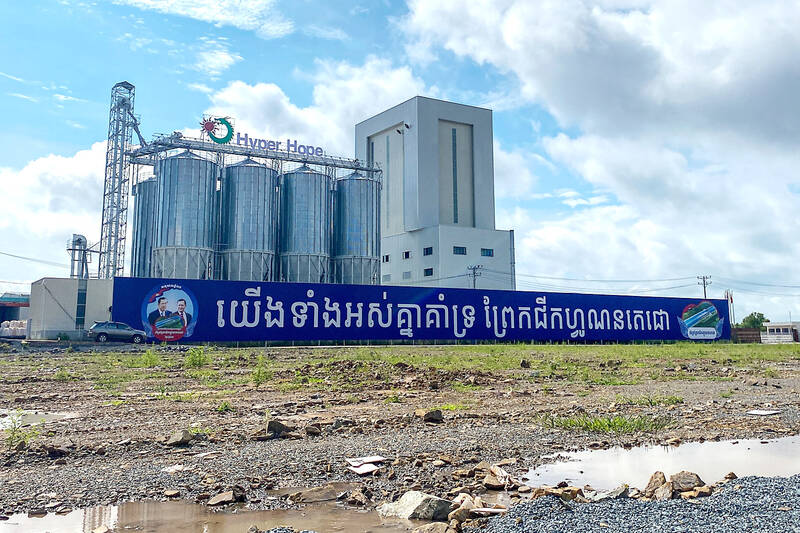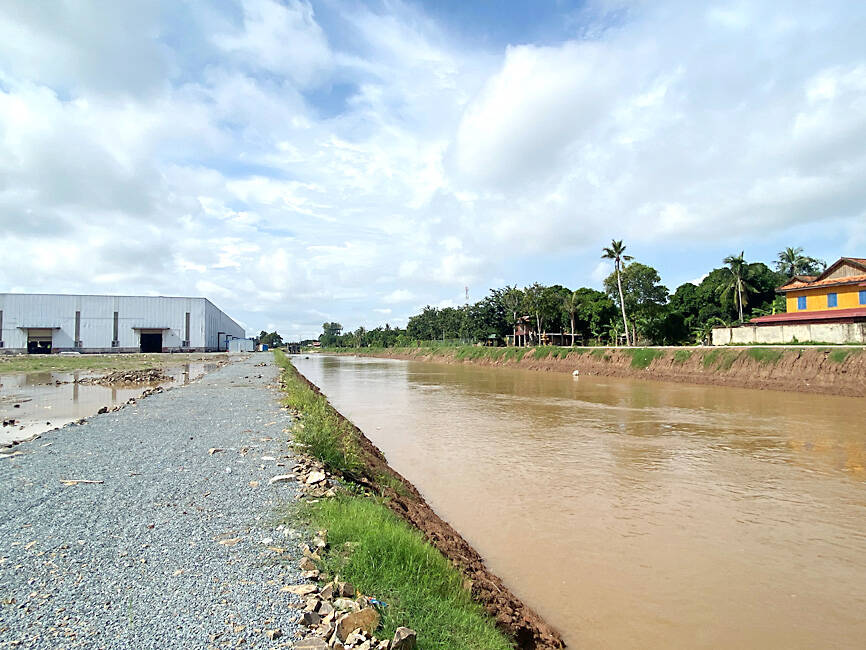At a ceremony in August, Cambodian Prime Minister Hun Manet knelt to receive blessings from saffron-robed monks as fireworks and balloons heralded the breaking of ground for a canal he hoped would transform his country’s economic fortunes.
Addressing hundreds of people waving the Cambodian flag, Hun Manet said China would contribute 49 percent to the funding of the Funan Techo Canal that would link the Mekong River to the Gulf of Thailand and reduce Cambodia’s shipping reliance on Vietnam.
Cambodia’s government estimates the strategic, if contentious, infrastructure project would cost US$1.7 billion, nearly 4 percent of the nation’s annual GDP.

Photo: Reuters
However, months later, China’s financial contribution remains in doubt.
Beijing has expressed misgivings about the project and has not made definitive commitments on its funding, four people directly involved in the investment plans or briefed about them said.
It underscores how Beijing is drastically downsizing its overseas investments as its domestic economic struggles, even in countries it considers strategic partners, such as Cambodia.

Photo: Reuters
Cambodia is widely seen by diplomats and foreign policy experts as a Chinese client state, owing to Beijing owning more than one-third of its total state debt.
However, Chinese investment in the Southeast Asian nation is now plunging, after a series of unsuccessful infrastructure projects, amid concerns over criminal gangs targeting Chinese nationals, and dropping tourist numbers.
The 180km canal would greatly expand an existing waterway and divert water from the fragile rice-growing Mekong Delta to the Gulf of Thailand, cutting Cambodian shipping through Vietnamese ports.
In the months after the Cambodian government in October last year signed an “investment framework agreement” with China Road and Bridge Corp (CRBC), a state-owned construction company, Cambodian officials went public about China’s financial involvement. The text of the deal is not public.
In an interview in May, the minister in charge of the project, Cambodian Deputy Prime Minister Sun Chanthol, said CRBC would develop the canal and “totally” cover its costs, getting a multi-decade concession in return.
However, at the August groundbreaking, the Hun Manet put CRBC’s share in the project at 49 per cent, with the remainder covered by Cambodian companies.
The same day, his father and former Cambodian prime minister Hun Sen in a statement on Facebook said that Japan would invest in the canal.
When asked last month about Cambodian assertions that CRBC would have a 49 percent stake, an official for the company said: “It’s very complicated,” without elaborating.
One person directly involved in the investment plans early this month said there was no Chinese money on the table at that stage.
A source from one of the Cambodian investors in the project said it would not be a surprise if China did not invest in the canal at all.
A fourth official briefed on the matter said China earlier this year had privately criticized Cambodian officials for announcing Chinese funding for the project that had not been decided.
They all declined to be named because of the issue’s sensitivity.
More than three months after the groundbreaking, the site of the ceremony on the bank of the Mekong is still abandoned.
Dithering over the canal comes as Chinese official development assistance to Cambodia, including infrastructure funding, is falling.
China’s disbursements to Cambodia are projected to drop to US$35 million in 2026 from more than US$420 million in 2021. There have been no new Chinese loans in the first half of this year, down from US$567 million in 2022 and US$302 million last year, official Cambodian data showed.
Chinese funding for overseas projects is also falling elsewhere, but in Cambodia, the impact “could be very pronounced,” said Grace Stanhope, a research associate at the Lowy Institute’s Indo-Pacific Development Centre.
China is still building roads and other infrastructure, but has pulled out from the construction of the new Phnom Penh airport, where it had initially committed US$1.1 billion.
That disengagement came as an expressway built by CRBC connecting Phnom Penh to the coastal city of Sihanoukville remained under-used by Cambodian motorists and truck drivers who to avoid tolls prefer the crowded, but free old road.
Another recently completed Chinese-backed airport at Siem Reap to serve the UNESCO World Heritage site of Angkor Wat “is very quiet,” said Ou Virak, head of Cambodian think tank Future Forum, adding that investors might face losses.
Chinese private investment remains high, but multiple Phnom Penh-based diplomats and financial experts said that once large inflows of Chinese informal funds destined to the gambling industry and real estate sector having dried up.
Chinese tourism, once a major source of income for Cambodia, has also struggled to recover from the COVID-19 pandemic.
That has coincided with a prolonged Chinese campaign warning tourists of risks linked to an online scams industry in Cambodia.
As relations between China and Cambodia evolve, the canal project’s fate and its sustainability remain uncertain.
“With so many unknowns, it’s no surprise to me that investors are getting cold feet on this project and have yet to show up with their money in hand,” said Brian Eyler, an expert on the Mekong region at US-based think tank Stimson Center.

Incumbent Ecuadoran President Daniel Noboa on Sunday claimed a runaway victory in the nation’s presidential election, after voters endorsed the young leader’s “iron fist” approach to rampant cartel violence. With more than 90 percent of the votes counted, the National Election Council said Noboa had an unassailable 12-point lead over his leftist rival Luisa Gonzalez. Official results showed Noboa with 56 percent of the vote, against Gonzalez’s 44 percent — a far bigger winning margin than expected after a virtual tie in the first round. Speaking to jubilant supporters in his hometown of Olon, the 37-year-old president claimed a “historic victory.” “A huge hug

Two Belgian teenagers on Tuesday were charged with wildlife piracy after they were found with thousands of ants packed in test tubes in what Kenyan authorities said was part of a trend in trafficking smaller and lesser-known species. Lornoy David and Seppe Lodewijckx, two 19-year-olds who were arrested on April 5 with 5,000 ants at a guest house, appeared distraught during their appearance before a magistrate in Nairobi and were comforted in the courtroom by relatives. They told the magistrate that they were collecting the ants for fun and did not know that it was illegal. In a separate criminal case, Kenyan Dennis

A judge in Bangladesh issued an arrest warrant for the British member of parliament and former British economic secretary to the treasury Tulip Siddiq, who is a niece of former Bangladeshi prime minister Sheikh Hasina, who was ousted in August last year in a mass uprising that ended her 15-year rule. The Bangladeshi Anti-Corruption Commission has been investigating allegations against Siddiq that she and her family members, including Hasina, illegally received land in a state-owned township project near Dhaka, the capital. Senior Special Judge of Dhaka Metropolitan Zakir Hossain passed the order on Sunday, after considering charges in three separate cases filed

APPORTIONING BLAME: The US president said that there were ‘millions of people dead because of three people’ — Vladimir Putin, Joe Biden and Volodymyr Zelenskiy US President Donald Trump on Monday resumed his attempts to blame Ukrainian President Volodymyr Zelenskiy for Russia’s invasion, falsely accusing him of responsibility for “millions” of deaths. Trump — who had a blazing public row in the Oval Office with Zelenskiy six weeks ago — said the Ukranian shared the blame with Russian President Vladimir Putin, who ordered the February 2022 invasion, and then-US president Joe Biden. Trump told reporters that there were “millions of people dead because of three people.” “Let’s say Putin No. 1, but let’s say Biden, who had no idea what the hell he was doing, No. 2, and